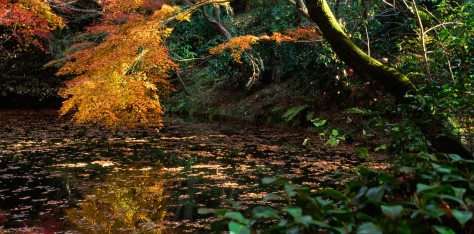Tip #3 Autumn / Winter tips
Getting your pond ready for winter
Cleaning
As the water temperature drops your fish will become much less active and they will enter a semi-hibernation state when the temperature is very low. The good thing is that as their metabolism slows, so does their production of ammonia and faecal matter thus reducing the load on your filtration system. However, at the same time there is a greater likelihood of an increased load in terms of rotting plant matter. Leaves can blow into the pond, lilies wither and release their decaying matter and filamentous algae may be dying back.
Your regular pond and filter cleaning interval in the summer can be reduced a little for the winter but during the months of October and November it is important that you are particularly vigilant that decaying plant matter does not build up in the pond and filter. Not only is decaying matter poor for water quality but it can cause drain and pipe blockages too and these may be more challenging to correct at this time of year.
Your brushes will be working hard at this time in terms of catching particles of matter in suspension. Simply flush them clean with pond water as you do normally. It is better to clean them little and often rather than doing deep cleaning only occasionally.
Pumps
This is a good time to check that your pumps are working correctly and that the suction inlet is not clogged with debris. If you have the ability to reduce the flow during the cold weather this can be a good idea. The pond is usually warmer at the bottom than at the surface so too much stirring of the pond will mix the water and disrupt this stratification thus reducing the average temperature. This is not normally a problem when water temperatures are around 8 degrees but it can cause stress to the fish in frosty weather. Additionally you may be able to save some electricity if, for example, you can turn off one of three pumps for the winter.
Food
When the water temperature goes below about 15 degrees it is much better to feed a wheatgerm pellet rather than high protein. This will be more digestible and appropriate in low temperatures. High protein foods simply cause extra water pollution in cold conditions and should be avoided.
The fish will guide you as to how much food they require. If you see food remaining in the pond after 5 minutes then reduce the quantity. At a certain point the fish will refuse food altogether and you can stop offering it until the water warms again in the spring.
Ice
If you get ice formation on the pond then be aware that if the pond ices over completely for more than a few days, this can place the fish at risk. A hole the size of a dinner plate should be sufficient to allow gaseous exchange and will prevent problems. There are a variety of commercially available products to help with this.
General
It is important to be vigilant through the winter months. You will naturally visit the pond less frequently at this time and so it is much easier to miss a problem such as a blocked drain or a failed pump. Simply make a point of checking the pond at least twice a week and then together with the points mentioned above, you should be well positioned to enjoy your pond again when the weather improves.



